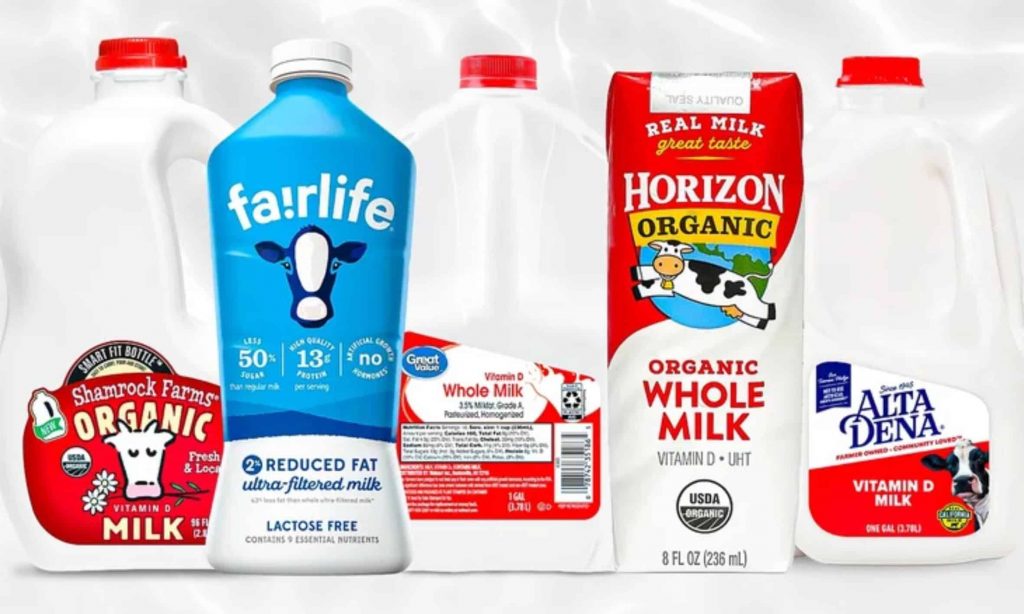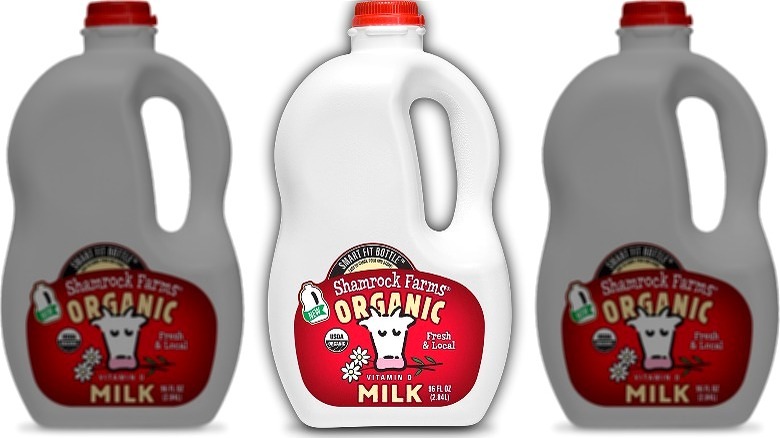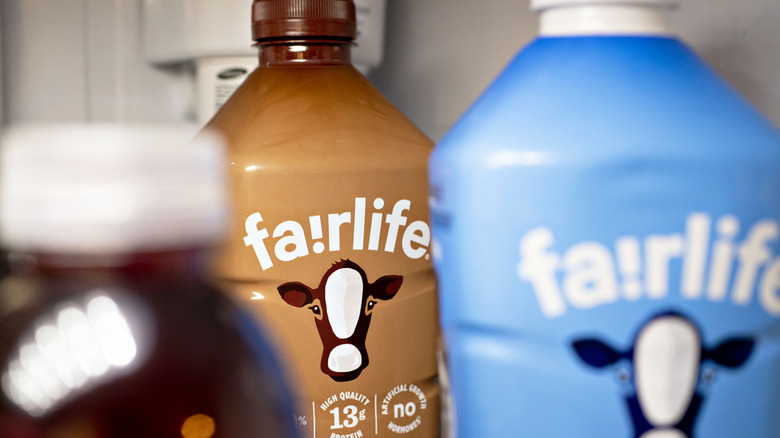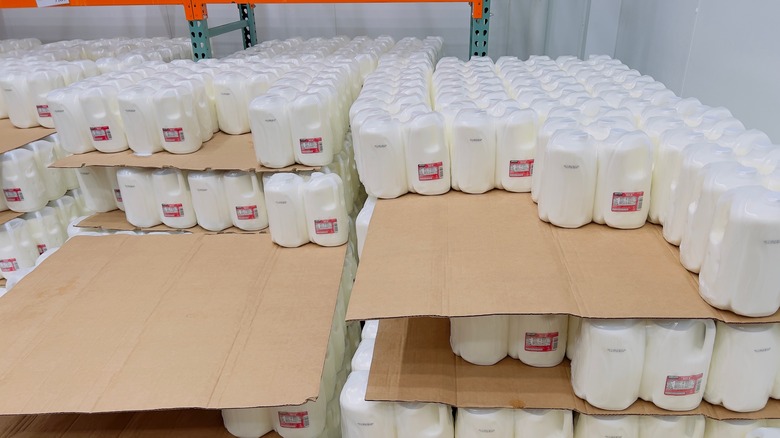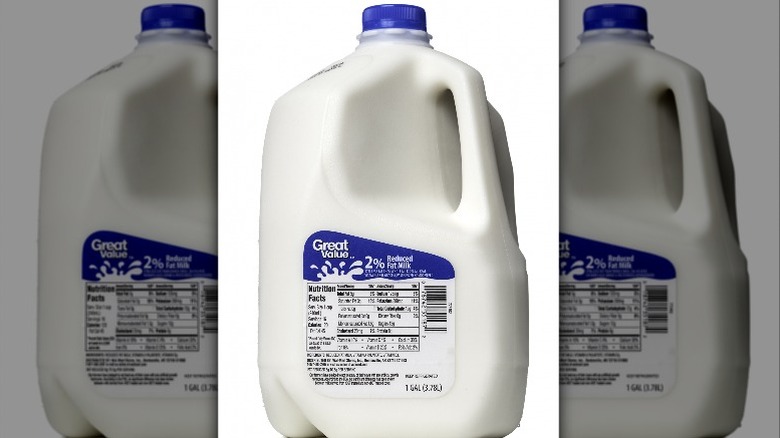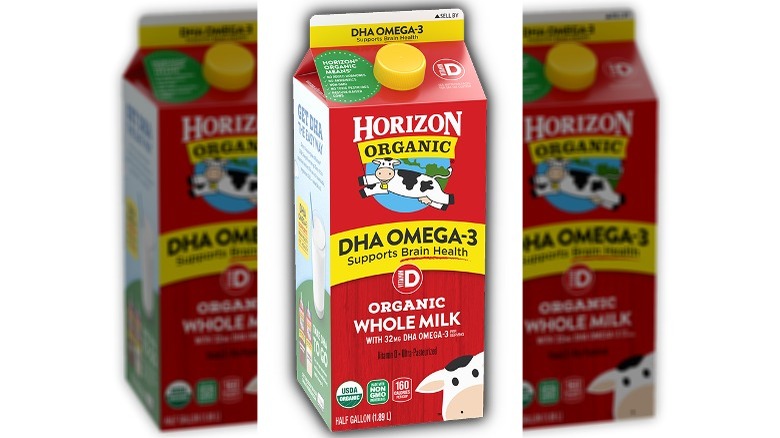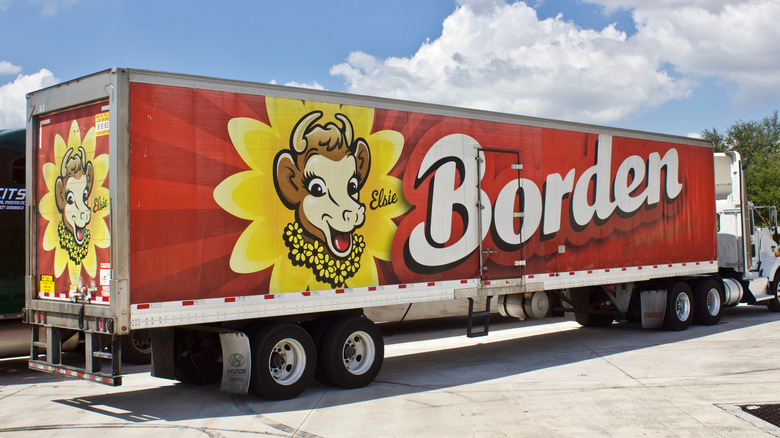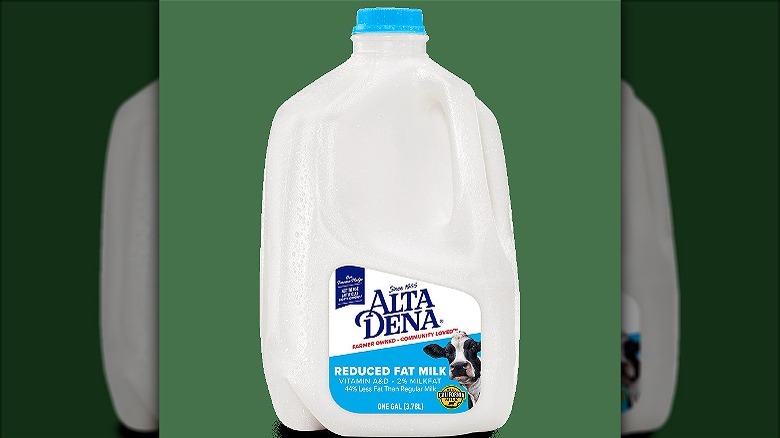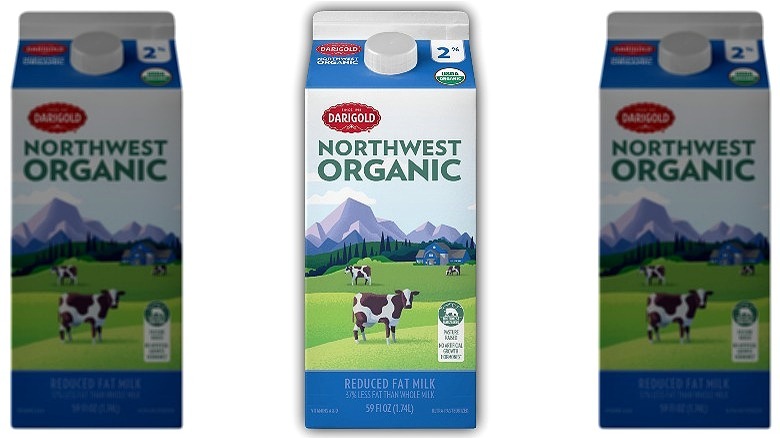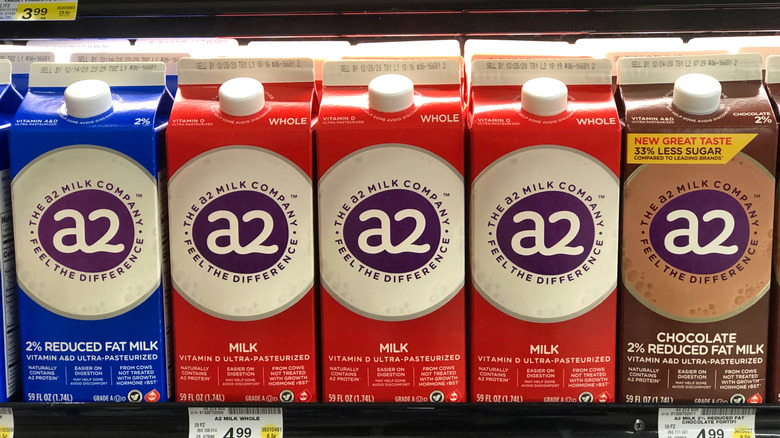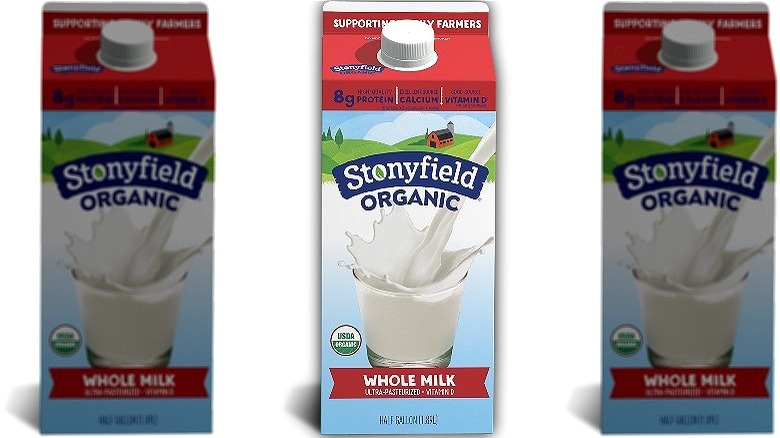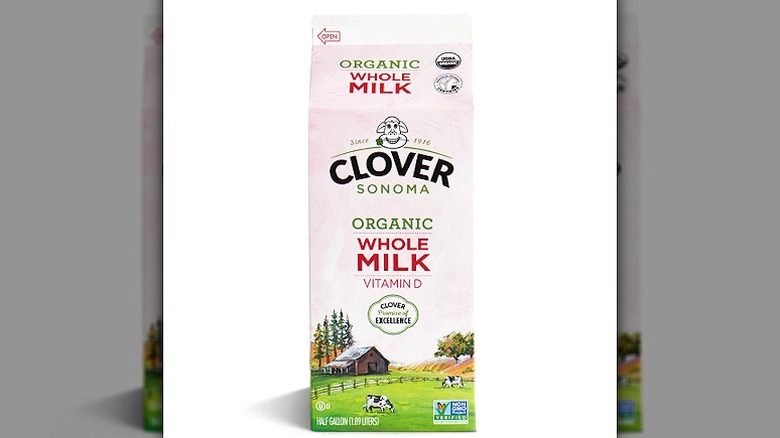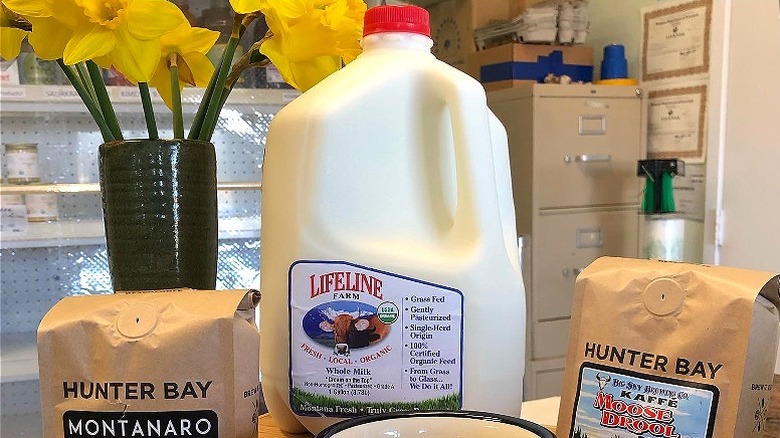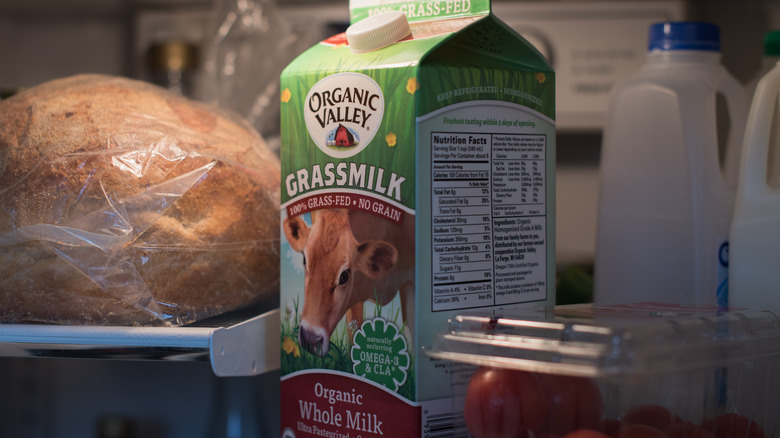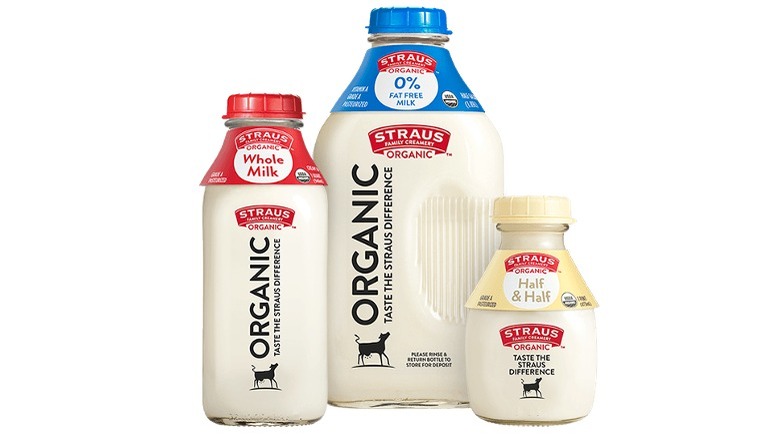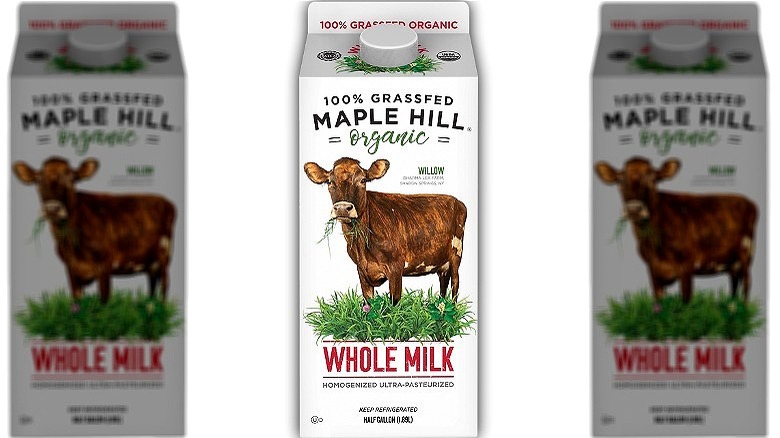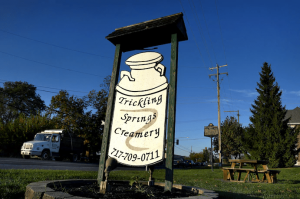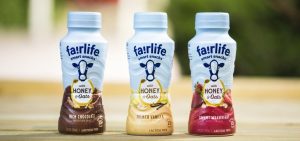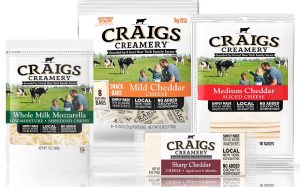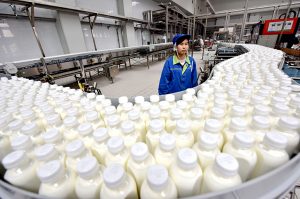13. Kirkland Signature
Kirkland Signature is Costco’s line of products. It has gained a reputation for providing cheaper alternatives to well-known name brands. The brand achieves its trademark low prices through many means, including efficient product design as exemplified by Kirkland Signature’s milk jugs. The milk jugs are rectangular in shape with no discernible spout. This makes them incredibly efficient to pack and transport, thus saving the company money.
Unfortunately, the same design makes it a nightmare for customers to pour milk. Spillages occur frequently, to much public frustration. Fortunately, Costco CEO Craig Jelinek is aware of this issue, saying in the company’s annual shareholders meeting: “You know, the milk jug is something that we’ve probably been working on for 15 years. In the last four years, we thought we improved it and fixed this problem with our last engineering that we did on the bottle. I haven’t heard many complaints recently … We can certainly look at some of the bottlers and see where the problem may be—if it’s in the container, if it’s how it’s being bottled,” (via Eat This, Not That!). Hopefully, Costco’s products will become more user-friendly in the near future.
12. Great Value
In 2018, Walmart opened its own milk processing plant in Indiana. The opening allowed the company to cut costs. At the time of publication, Walmart’s Great Value brand sells a gallon of whole milk for around $3.
Despite this reasonable price point, Great Values milk is good quality. It does not come from cows that have been treated with artificial growth hormones. It’s also fortified with vitamin D. One cup of Great Value whole milk actually contains 25% of an adult’s daily recommended vitamin D intake.
The one thing preventing this product from ranking higher on our list is its alarming tendency to spoil quickly. Numerous reviewers, such as this one, have expressed their displeasure on Walmart’s website: “The milk is curdling long before the milk experies, I am starting to wonder what we’re buying I just went to open the second gallon just now and it was thick almost like a thin pudding … This is happening way to many times.”
11. Horizon Organic
Horizon Organic is a brand that sells a range of organic milks, including whole-fat, low-fat, and flavored options. All of the brand’s milk is certified organic by the USDA. As such, the cows that produce Horizon Organic’s milk spend at least 120 days outside on grazing pastures per year. The cows themselves only eat organic and non-GMO food, and they are also not treated with growth hormones.
Horizon Organic has received criticism concerning its DHA Omega-3 Milk. DHA is an omega-3 fatty acid that is supposed to support good brain health and function, according to Mount Sinai. It isn’t the fatty acid itself that has caused alarm, but rather how it is made. Horizon Organic produces its DHA Omega-3 through an industrial brewing technique involving algae, a process some people believe should not form part of an organic milk product.
Charlotte Vallaeys, a senior policy analyst at Consumer Reports, explained this to Chicago Tribune: “We do not think that [the oil] belongs in organic foods. When an organic milk carton says it has higher levels of beneficial nutrients, like omega-3 fats, consumers want that to be the result of good farming practices … not from additives made in a factory.” Fortunately, Horizon Organic also produces several milk products that do not contain DHA, meaning those with an aversion to the process can still enjoy Horizon Organic milk.
10. Borden Dairy
Borden Dairy’s history begins in the mid-19th century. It continues to this very day through a diverse range of products. Like many other brands on this list, Borden Dairy’s milk is produced by cows that have not been injected with recombinant somatotropin, known as rBST. This hormone increases the cow’s ability to produce milk, but has also been cited as a potential cause of some cancers in human milk drinkers (via Breast Cancer Prevention Partners).
Aside from numerous low or no-fat milk products, Borden Dairy also produces a range of flavored milks that are highly popular. Chief amongst these is the brand’s creamy and indulgent chocolate milk that boasts 9 grams of protein per 1-cup serving. This makes it a perfect post-workout beverage, as one customer highlighted on Amazon: “Creamy and rich! What more can you ask for? If you are looking for a rich, high calorie, after workout booster or morning kickoff chocolate milk, this is for you.”
9. Alta Dena Dairy
Alta Dena Dairy is a brand that’s part of the Dairy Farmers of America cooperative. The number of products that Alta Dena Dairy produces is vast. It includes both whole-fat lactose-free milk and 2% fat lactose-free milk, making the brand a favorite of Americans with lactose intolerances.
All of the milk products produced by Alta Dena are known for their luxurious texture and rich taste. This is an extra bonus for reduced-fat milk drinkers who are often stuck with milk products that lack whole-fat milk’s creamy texture. This was noted by one customer on Amazon: “In all of these years I never noticed a difference in milk brands until trying this milk. It’s 2% but it tastes rich, more like whole milk than any other brand I’ve tried. I really like the new bottle as well. Smaller, takes up less space, and is easier to handle.” The quality of the brand’s low-fat milk options means Alta Dena Dairy is a great option for those looking to cut back on their fat intake, without compromising on flavor.
8. Darigold
Darigold is one of the few milk brands on this list that offers both an organic and non-organic range of products. The non-organic range is considerably more expensive than many other nationally available milk brands. For example, a gallon of Darigold’s whole-fat (non-organic) milk costs around $5.59, which is significantly more than Target’s Good & Gather brand whole milk. Darigold justifies this elevated price point through the longevity of its products. The milk undergoes a process of ultra-pasteurization, meaning it lasts up to three times as long as high-temperature, short-time pasteurized milk.
This extra duration is especially important for those that buy the large, one-gallon jugs of milk, as this customer explained on Darigold’s website: “I love milk, but I am extremely sensitive to even the slightest rancidity in it. Traditionally pasteurized milks usually start to sour within a few days of opening (and sometimes even before opening). Darigold milk is ultra-pasteurized and therefore stays fresh long after being opened. As a result, Darigold milk tastes fresher, sweeter, and cleaner than regular milk … It costs a little more than regular milk, but this is one of those products that’s definitely worth buying name brand.”
7. A2
A2’s products claim to be easier to digest than other milks on the market. The brand only milks cows that produce milk containing A2 β-casein. This protein is less common than the blend of both A1 and A2 β-caseins that is found in most milks.
Several scientific studies have demonstrated that drinking milk that only contains A2 β-casein results in significantly less gastrointestinal stress — including one published in the journal Nutrients – when compared with conventional A1 and A2 β-casein containing milk. Other critical reviews disagree.
The colloquial evidence is also split. Some reviewers state the milk had no effect. But others, such as this Amazon reviewer, claimed life-changing effects: “Incredible! I have considered myself lactose intolerant for years … it was actually my husband who found fresh A2 milk at our local Whole Foods store a few weeks back. It not only did not cause me stomach distress, but now we both drink it because we think the taste is far superior to the standard milk available in this country.”
A2 sells both grass-fed whole milk and grass-fed 2% milk. All cows that produce milk for grass-fed products are on pasture every day of the year. The milk is also certified regenerative by A Greener World, an animal welfare group also known as AGW. Finally, all A2 cows, whether they produce milk for the regular or grass-fed range, are Validus certified. This means all cows undergo a rigorous inspection to ensure animal welfare is up to scratch.
6. Stonyfield Organic
Stonyfield Organic has been a purveyor of organic dairy products – most famously yogurt — for decades. All of Stonyfield Organic’s milk products are certified organic by USDA, meaning they are made without the use of artificial flavors, toxic pesticides, artificial hormones, and antibiotics. Unfortunately, being organic doesn’t come cheap; a half gallon of Stonyfield Organic whole milk costs around $5.
One drawback of the milk is that it is not 100% grass-fed. Fortunately, this does not impact the flavor too much as one customer highlighted on Influenster: “Great milk that we love for the taste and also because it’s organic, I wish it was also grass fed but it’s great for our daughters babas & in cereal! Also drink it in coffee sometimes if we run out of half & half. All around it’s a great option!”
One area where Stonyfield Organic really excels is championing organic, sustainable farming practices. This is an integral part of the brand. Stonyfield Organic even runs initiatives that help other commercial farms transition to organic practices.
5. Clover Sonoma
Clover Sonoma is a northern Californian dairy brand that has been consistently recognized as a leader in animal health and wellbeing. As the first American Humane-certified dairy in the U.S., Clover Sonoma maintains unparalleled animal welfare standards. Cows are on pasture at every opportunity and are fed a well-rounded diet of grass, preserved forage, and some feed. All staff that work on the farms also undergo extensive training.
The painstaking approach to animal welfare is reflected in the quality of all of Clover Sonoma’s milk products. These milks are fresh tasting and have a creamy texture. What’s more, the milk has a fantastic shelf life, a feature that’s not that common amongst organic milks. One customer highlighted this on Social Nature: “Very delicious and moist. It has a much longer shelf life than regular milk. You won’t have to worry about spoiling before you have a chance to finish it all. I also liked the farm’s focus on animal well-being. I plan to buy this often.”
4. Lifeline Farm
Lifeline Farm is an organic meat and dairy farm located in Montana. A herd of 400 Brown Swiss cows is used to produce the farm’s milk. The cows spend the vast majority of their time on pasture and their diet is supplemented with organic feed that’s grown on-site.
The milk these animals produce is vat pasteurized, a process that uses significantly lower temperatures than other commercial pasteurization processes. Vat pasteurization kills all harmful bacteria without destroying beneficial bacteria or nutrients as other, high-heat pasteurization techniques do. As such, Lifeline Farm’s milk may contain more nutrients than other brands. The only drawback of this method is that the milk won’t last as long as ultra-pasteurized products.
While the milk is exceptional, Lifeline Farm cannot rank higher on our list given the brand’s limited distribution. Currently, Lifeline Farm’s products can only be found in Montana and Oregon. If you live in these states, we recommend seeking out this small but impressive brand.
3. Organic Valley
Organic Valley is a USDA organic-certified dairy brand that produces a wide range of products. In regards to milk, Organic Valley sources from a range of small, organic farms. These have an average herd size of only 78 cows, a stark contrast to the thousand-strong mega-herds seen at some dairies. The cows also spend, on average, 180 days on pasture each year.
The company’s attention to detail also pertains to how the milk is processed. The brand’s lactose-free milk is made with exactly the same milk as the other products: the lactose is broken down by a natural enzyme resulting in a creamy, luxurious milk product that’s safe for lactose intolerants.
The taste of the milk is so good that even people that can stomach lactose buy it, as this customer highlighted on Amazon: “This is the best milk I’ve ever had. I’m not even lactose intolerant, but lactose-free milk tastes better than regular milk and this brand tastes better than any milk I’ve ever tasted hands down. It’s definitely the most expensive milk I’ve ever bought, but for me it’s worth it.” Organic Valley also offers milk that’s produced by cattle that are 100% grass-fed, along with regular whole fat, reduced fat, and flavored options. In other words, there’s an Organic Valley milk suitable for every preference.
2. Straus Family Creamery
Another northern Californian brand that makes our list is Straus Family Creamery. The milk sold by this brand is sourced from 12 local dairies. Each of these dairies raises their herds on a diet dominated by the area’s sweet grasses. The rest of the cows’ food comes in the form of certified organic grains. This balanced, wholesome diet is reflected in the milk’s flavor, which is sweet and nuanced.
Avoiding ultra pasteurization allows both flavor and healthy bacteria to survive, meaning Straus Family Creamery’s milk has a nutritional profile to rival its excellent taste. One customer gushed over the milk’s health benefits on Amazon: “Their Full Fat Whole Milk is so delicious and so very good for you! They leave the processing to your digestion instead of putting additives in their milk like all other dairies in the US! Low temperature pasteurization means that the good gut friendly bacterium is alive and well in this milk and the bad bacteria are gone, and grass fed and finished, so no GMO soy here either.”
1. Maple Hill Organic
Maple Hill Organic is the milk brand that tops our list. This is thanks to its brilliant marriage of organic ethos and practicality. On the organic side, all Maple Hill Organic products come from 100% grass-fed cattle which eat fresh grass on pasture as well as dried grass harvested from the brand’s own fields. This creates a raw product that is rich in flavor and nutrients as one customer explained on Influenster: “This milk is wonderful! If you remember back to when you used to get a milk delivery on your doorstep and how delicious that milk tasted, this is even better than that. This milk is a bit pricey when you compare it to other brands but it is well worth it. The fact that it is made by grass fed cows makes all the difference in the taste and health benefits of milk.”
In terms of practicality, Maple Hill Organic uses a process of ultra-pasteurization for its milk products. While this eliminates some of the milk’s flavor and nutrients it gives the product a much longer shelf life, which is an important feature for many consumers. Additionally, the milk is priced fairly. The organic whole milk comes in at around $6.59 per half gallon. This is on the upper end of the price scale, but given that the product is one of the longest-lasting, best-tasting milks out there, we think it is reasonable.
